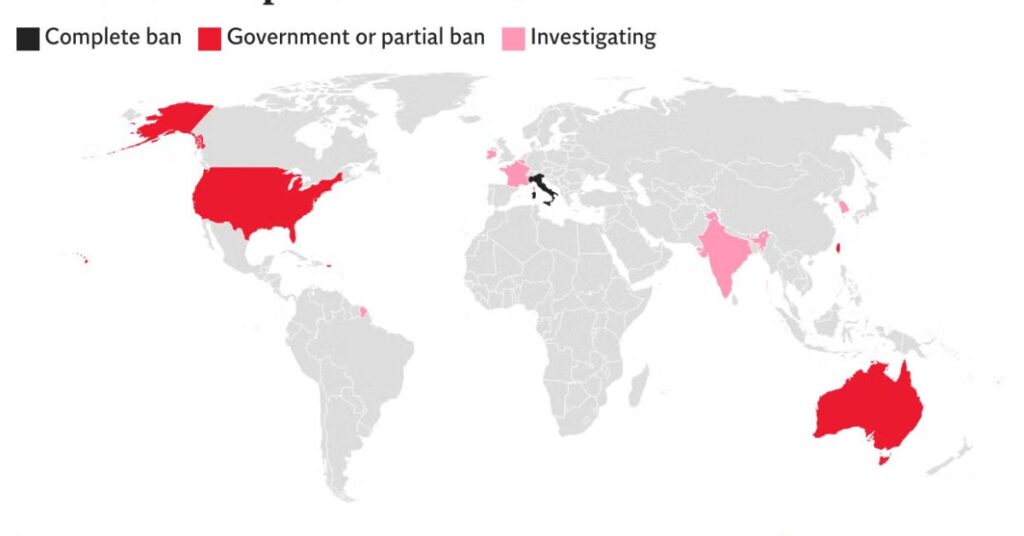DeepSeek, a Chinese artificial intelligence (AI) chatbot, has garnered significant global attention for its advanced capabilities and competitive pricing. However, its meteoric rise has been accompanied by mounting concerns over data privacy, national security, and compliance with international regulations.
As a result, several countries and organizations have either banned or restricted its use. This article explores the reasons behind these bans and identifies the regions where DeepSeek is prohibited.
What is DeepSeek?
DeepSeek is an AI-powered chatbot developed by Chinese companies Hangzhou DeepSeek Artificial Intelligence and Beijing DeepSeek Artificial Intelligence.
It gained worldwide popularity for its ability to rival leading AI models like OpenAI’s ChatGPT while being significantly more cost-effective. Despite its technological achievements, DeepSeek’s data practices have raised red flags globally, particularly due to its storage of user data on servers located in China.
Under Chinese law, companies must share data with the government upon request, fueling fears of potential misuse.
Countries Where DeepSeek is Banned

Italy
Italy was among the first nations to ban DeepSeek. The Italian Data Protection Authority (DPA) cited violations of the General Data Protection Regulation (GDPR) as the primary reason.
Concerns were raised about how user data was collected, stored, and processed. The app was removed from Apple and Google app stores in Italy as part of the ban.
Taiwan
Taiwan’s Ministry of Digital Affairs banned DeepSeek across government agencies due to national security risks. Officials expressed concerns about potential cross-border information leaks and emphasized that using the app could jeopardize critical infrastructure and public sector data.
Australia
Australia prohibited the use of DeepSeek on all government devices, citing unacceptable risks to national security. The directive applies to federal government systems but does not extend to private citizens.
United States
Although not banned nationwide, several U.S. states and federal agencies have imposed restrictions on DeepSeek:
- Texas became the first U.S. state to ban it on government-issued devices.
- Agencies like NASA, the Pentagon, and the U.S. Navy have prohibited its use due to security concerns.
- A proposed bill by Senator Josh Hawley aims to criminalize the use of AI technologies developed in China, including DeepSeek.
South Korea
South Korea’s Ministry of Industry temporarily banned employee access to DeepSeek over concerns about cybersecurity vulnerabilities.
Countries Considering Action Against DeepSeek:
Other nations are closely monitoring DeepSeek’s operations:
- Belgium, France, and Ireland are investigating its compliance with privacy laws.
- India has advised government employees against using AI apps like DeepSeek due to potential risks but has not yet issued an outright ban.
Reasons Behind the Bans
1. Data Privacy Concerns
DeepSeek’s privacy policy reveals that user data—including chat histories, IP addresses, and device information—is stored on servers in China. This raises alarms about potential access by Chinese intelligence agencies under local laws[3][10][26].
2. National Security Risks
Governments fear that sensitive information could be exploited for espionage or other malicious activities. For instance:
- Taiwan flagged risks related to cross-border data transmission.
- The U.S. Navy highlighted ethical and security concerns tied to using Chinese AI tools.
3. Regulatory Non-Compliance
DeepSeek has faced scrutiny for failing to meet international data protection standards like GDPR in Europe. Italy’s DPA found gaps in transparency regarding how user data was processed.
4. Cybersecurity Vulnerabilities
Studies have revealed that DeepSeek’s AI models are susceptible to generating insecure or malicious code, posing risks for users and organizations alike.